Best on ground in grand finals: (from left) Robert Walls 1972, Bill Barrot 1967, Brendan Edwards 1961.
The Norm Smith Medal, honouring the player judged best on ground in each year’s AFL grand final, was introduced in 1979 and quickly became one of Australian football’s most important awards.
We’ve seen 42 awarded since Carlton’s Wayne Harmes won the first (including two in 2010, when Collingwood beat St Kilda in a grand final replay). Four players – Gary Ayres, Andrew McLeod, Luke Hodge and Dustin Martin – have won two.
But what about all those grand final heroes before 1979? Don’t they deserve appropriate recognition also for their performances in the season’s most important match?
In rugby league, the NRL in 1986 introduced its equivalent of the Norm Smith Medal, the Clive Churchill Medal.
But in 2008, it decided to also award retrospective medals from 1954-85 as a mark of respect for its greatest grand final players. If the NRL can honour its past grand final greats, why can’t the AFL? It’s not as though it’s an impossible task.
Expert panels were assembled by the newspapers at the time of these matches to rate the best players in grand finals, and their ratings were often clean-sweep victories for one player in particular.
The combined votes of The Age and the Herald-Sun panels from the time should be enough to decide the worthy winner of this award. And if not, there is video footage of every grand final from 1961 onwards to back up a particular selection.
Indeed, that year the video footage provides emphatic evidence of Brendan Edwards from Hawthorn being best on ground in the Hawks’ first premiership win.
He was a class above all other players, toying with his opponents and breaking tackles as if they were nothing more than minor irritants, also kicking the goal of the day. Edwards obtained a clean sweep of best on ground votes from The Sun newspaper’s panel.
Back in 2001, the grand final edition of the AFL’s “Football Record” assembled panels to review grand finals from 1965-78, using three modern day judges for each game to come up with an unofficial Norm Smith medallist.
For this article, however, we are using the experts who lived and breathed the football of their time.
Among the judges from either the “Sun News-Pictorial” or “The Age” panels were Norm Smith himself, plus such luminaries as Percy Beames, triple Brownlow medallist Ian Stewart, Doug Wade, Mike Sheahan and Lou Richards.
Unlike the 2001 selections, there were more than three people on the panels as well. For instance, in 1967, there was a total of 14 panellists (six from The Age and eight from The Sun).
Would this award mean much to the surviving players yet to receive official recognition? Ask them.
Gary Crane, the logical choice as best on ground in the 1968 grand final, told Carlton Football Club historian Tony De Bolfo in 2018: “I would be over the moon to win a Norm Smith Medal. Norm Smith was an idol of mine.
“They (the AFL) spoke about it (awarding retrospective medals) a while ago, but I don’t know what came of it. Whatever the case, they’d want to get a move on, as I’m not getting any younger … and it would be lovely.”
Here is the list of players in line for retrospective Norm Smith Medals based on the votes from the experts from the newspapers at the time. And the evidence of just how good their grand final performances were.
1961: BRENDAN EDWARDS (HAWTHORN)
Ron Carter, from “The Age”, stated: “Hawthorn’s centreman Brendan Edwards was by far the best player afield.” Edwards also obtained a clean sweep from the panel at “The Sun”, where all four writers judged him best on ground. Edwards accrued 33 kicks. Cracking 30 possessions in a match was a rare achievement in 1960s football. The next best in this game was 21 kicks.
The Votes
Brendan Edwards (Haw) 12, Graham Arthur (Haw) 4, Morton Browne (Haw) 4
1962: JACK CLARKE (ESSENDON)
Jack Clarke had 25 kicks, two handballs and three marks, and was rated best on ground by Percy Beames of “The Age”. “The Essendon captain was by far the most constructive player on the field,” he said. Clarke also obtained a clean sweep from all five judges from “The Sun”.
The Votes
Jack Clarke (Ess) 15, Serg Silvagni (Carl) 4.5 votes, John Birt (Ess) 3.5
1963: GRAHAM FARMER (GEELONG)
The newspapers were full of praise for “Polly”. In “The Sun”, Lou Richards said: “You can call the big Cat ‘Mr Perfection from Perth’ or the ‘G that starts and ends Geelong’.” Beames, chief football writer at “The Age”, and himself a three-time Melbourne premiership player, rated Farmer best on ground. The Geelong ruckman also obtained a clean sweep of seven judges from The Sun’s newspaper. South Melbourne champion Bob Skilton, writing for “The Herald”, also rated Farmer as the best player.
The Votes
Graham Farmer (Geel) 21, Bill Goggin (Geel) 7, Gordon Hynes (Geel) 5
1964: BRIAN DIXON (MELBOURNE)
“The biggest single factor in Melbourne’s win was the magnificent performance of veteran wingman Brian Dixon,” wrote Ron Carter in “The Age”. Collectively, the panel on “The Sun” also voted the Melbourne wingman best afield, Dixon finishing with 24 kicks and six marks in the Demons’ thrilling four-point win.
The Votes
Brian Dixon (Melb) 14, Kevin Rose (Coll) 8, Hassa Mann (Melb) 3
1965: TED FORDHAM (ESSENDON)
Beames rated Fordham, who finished with seven goals in the Bombers’ win, as the best on ground. “It was Fordham, with his steel-fingered marking and goalkicking that hammered the nail in St Kilda’s coffin,” he wrote. St Kilda star Ian Stewart, writing in “The Herald” the following Monday after having played in the Saints’ losing side, also chose Fordham as his best. “Any full-forward who can kick seven goals in a tough grand final is an exceptional player,” he wrote. Six of seven panellists on “The Sun” also deemed Fordham best on ground.
The Votes
Ted Fordham (Ess) 19, Brian Sampson (Ess) 14, Barry Davis (Ess) 3
1966: IAN COOPER (ST KILDA)
Beames rated Cooper, who finished St Kilda’s famous one-point victory over Collingwood with 23 possessions and seven marks, best on ground. Five of the seven “Sun” experts also rated Cooper best.
The Votes
Ian Cooper (StK) 16, Brian Sierakowski (StK) 7, Ian Stewart (StK)
PLEASE HELP US CONTINUE TO THRIVE BY BECOMING AN OFFICIAL FOOTYOLOGY PATRON. JUST CLICK THIS LINK.
1967: BILL BARROT (RICHMOND)
Barrot, who with 27 disposals was the leading possession-getter in the game, made a clean sweep of best on ground votes from the panel on “The Age”, winning 18 votes from the paper’s judges, the next-highest player with just six. Barrot also won 23 of a possible 24 votes from writers on “The Sun”.
The Votes
Bill Barrot (Rich) 41, Tony Polinelli (Geel) 18, Royce Hart (Rich) 12
1968: GARY CRANE (CARLTON)
No other winger in any of the other grand finals from the 1960s could match Crane’s possession count of 29. It was normally ruck-rovers, rovers or centremen who racked up the most touches, but Crane bucked that trend. He also has the distinction of receiving votes from the newspaper panels for the 1969 and 1973 grand finals.
The Votes
Gary Crane (Carl) 33, John Nicholls (Carl) 21, Darryl Gerlach (Ess) 11
1969: BRYAN QUIRK (CARLTON)
Quirk, who finished with 26 possessions and nine marks in a losing side, received best afield votes from all the writers on “The Age”, including Norm Smith himself. In “The Sun”, Lou Richards was similarly glowing. “Carlton’s hero was undoubtedly winger Bryan Quirk, who surprised everyone – Francis Bourke and Dick Clay most of all – by being far and away best man on the ground,” he wrote.
The Votes
Bryan Quirk (Carl) 32, Michael Green (Rich) 12, Kevin Bartlett (Rich) 11
1970: BRENT CROSSWELL (CARLTON)
Crosswell dominated the best on ground votes from the writers on both “The Age” and “The Sun” in Carlton’s amazing comeback from a 44-point half-time deficit against Collingwood. Crosswell, who finished with 23 possessions, seven marks and two goals, blitzed the field with a total of 35 votes. The next highest combined total was Collingwood’s Ross Dunne on 16 votes.
The Votes
Brent Crosswell (Carl) 35, Ross Dunne (Coll) 16, David McKay (Carl) 11, Barry Price (Coll) 11
1971: BARRY LAWRENCE (ST KILDA)
Lawrence played on one of the greatest full-forwards in VFL/AFL history, Peter Hudson, in the 1971 Grand Final. Rarely do defenders get the nod as best on ground in a grand final, but this was a special performance, Lawrence responsible for preventing Hudson breaking Bob Pratt’s season record of 150 goals, memorably smothering a shot from point-blank range late in the game, which Hawthorn came from behind to win.
The Votes
Barry Lawrence (StK) 27, Don Scott (Haw) 23, Kelvin Moore (Haw) 12
1972: ROBERT WALLS (CARLTON)
When Walls’s six goals (along with 28 disposals and 10 marks) in the Blues’ record scoreline of 28.9 (177) are combined with his incredible seven goals assists, you have 78 points either directly from him or a teammate as a direct result of one of his possessions. Although Beames from “The Age” rated Walls best on ground, the paper did not provide a panel of judges for this grand final. “The Herald”, however, did have a panel, including chief football writer Alf Brown, Bob Davis and John Goold. They collectively deemed Walls as the best player in this grand final, as did “The Sun”.
The Votes
Robert Walls (Carl) 20, John Nicholls (Carl) 6, Peter Jones (Carl) 6, Alex Jesaulenko (Carl) 6
1973: KEVIN BARTLETT (RICHMOND)
Kevin Bartlett, who finished with 26 disposals and a goal in the Tigers’ turning of the tables on Carlton in 1973, would be remembered as a dual Norm Smith medallist if this award were made retrospective, having officially won the second medal for his seven goals in 1980.
The Votes
Kevin Bartlett (Rich) 25, Kevin Sheedy (Rich) 21, Gary Crane (Carl)13
1974: ROYCE HART (RICHMOND)
Hart won his best on ground status largely as a result of his three goals in the second quarter, North Melbourne in front until Hart’s second-term blitz. He’d finish with 22 disposals and five marks to go with his three goals in the Tigers’ second straight grand final win.
The Votes
Royce Hart (Rich) 45, Kevin Sheedy (Rich) 40.5, Keith Greig (NM) 26
1975: PETER KNIGHTS (HAWTHORN)
Under the heading “Great day for Knights” the panel from “The Sun” collectively viewed Hawthorn’s key defender Peter Knights as the best player even in a grand final his team lost by a comprehensive 55 points. All three of the highest vote-getters in this match were defenders, North’s John Rantall and Brent Crosswell picking up the bulk of the remaining votes.
The Votes
Peter Knights (Haw) 28, John Rantall (NM) 23, Brent Crosswell (NM) 21
1976: JOHN HENDRIE (HAWTHORN)
Hendrie dominated the air in the Hawks’ 30-point win, taking 11 marks to go with 20 disposals, and but for inaccuracy (he finished with 2.8) could have turned in arguably one of the best grand final games of all time. It was a satisfying performance for Hendrie. Not only did his team turn the tables on North Melbourne, but he avenged an ordinary day the previous year when Crosswell had held him goalless and to only three marks. “I wasn’t the toughest player in the team, but when I look back on that grand final I am amazed at the ferocity with which I played,” Hendrie said.
The Votes
John Hendrie (Haw) 31, Peter Knights (Haw) 20, Barry Rowlings (Haw) 8
1977 (DRAW): WAYNE SCHIMMELBUSCH (NORTH MELBOURNE)
North Melbourne wingman Wayne Schimmelbusch, with 22 disposals, was voted best on ground by the panels at “The Sun” and “The Age” in only the second grand final draw in history.
The Votes
Wayne Schimmelbusch (NM) 19, Stan Alves (NM) 13, Stan Magro (Coll) 12
1977 (REPLAY): MALCOLM BLIGHT (NORTH MELBOURNE)
Blight struggled with just 14 possessions and two behinds in the drawn grand final. In the replay he almost doubled that tally, 27 disposals, five marks and two goals the sum of his work as the Roos won their second premiership against Collingwood.
The Votes
Malcolm Blight (NM) 17, Arnold Briedis (NM) 14, John Byrne (NM) 11
1978: ROBERT DIPIERDOMENICO (HAWTHORN)
Still a relative unknown even after four years with the Hawks, “Dipper” picked the perfect time to turn in his breakout game. Under the heading of “Robert voted best”, the panel on “The Sun” gave DiPierdomenico best on ground status narrowly ahead of Leigh Matthews, referring to his rise from being dragged from the ground in a 1977 reserves game to best on ground in the seniors’ most important match of the season.
The Votes
Robert DiPierdomenico (Haw) 25, Leigh Matthews (Haw) 23, Terry Wallace (Haw) 13

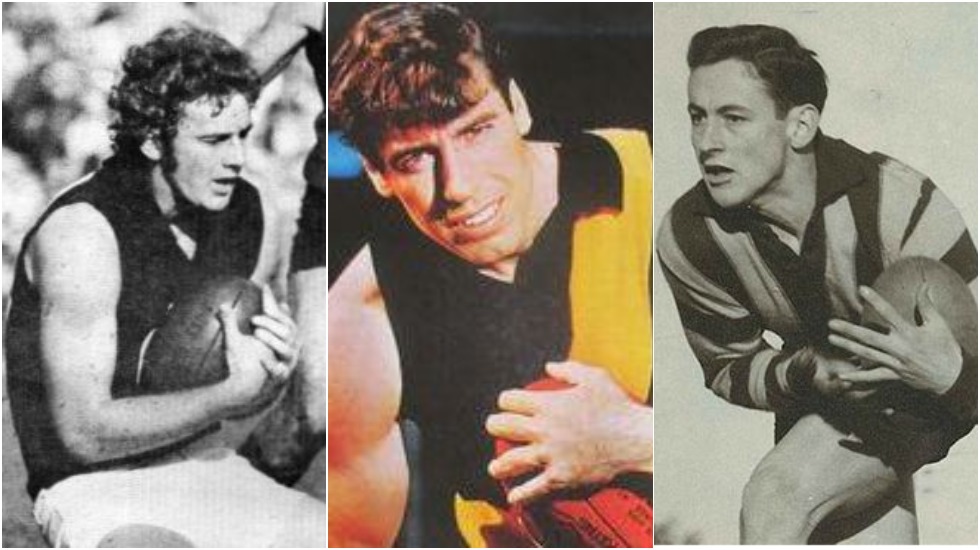
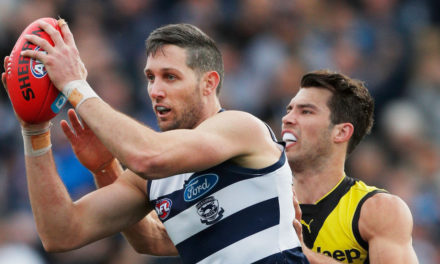
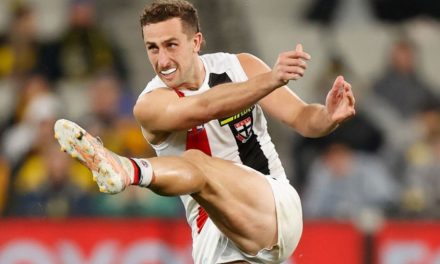
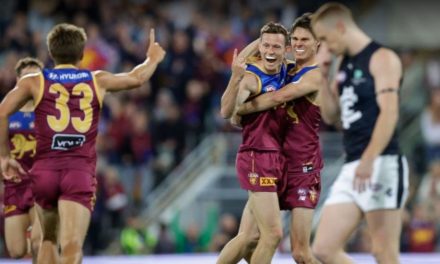
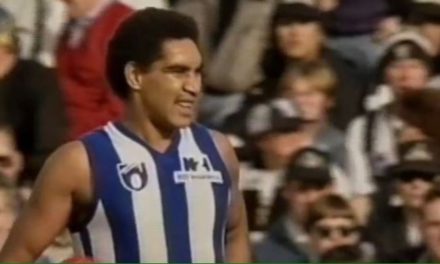

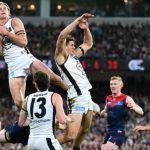
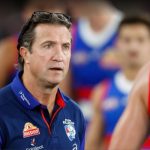



Reading that list add further weight to this argument. There’s several names there from the ’60s that I’d never heard of because they never get mentioned in the teams’ greatest players. This award would help give them the recognition they deserve. Great idea.
I’m going to be biased (I am a north supporter, but always loved Peter Knights too), but I watched the 75 grand final again one day recently when I was crook, and I had Brent Crosswell as BoG by far. Knights was good, but Crosswell was influential, when the game was in the balance (a bit like I think Bachar Houli was stiff not to win it in Richmond’s 2017 win, as he was so influential in that first half in keeping Adelaide out of it). I reckon Crosswell would have been one of only a few players in both teams that would have been able to play modern football (with modern conditioning of course). Awesome player.
John, I agree with you. I can see the appeal of voting for Crosswell. One of the most enduring memories I have from this match occurred after Crosswell took what appeared to be a simple backline mark in the third quarter. The way his chest was puffed out, head held high and the manner in which he shoved aside his opponent, Barry Rowlings, with disdain; all of this, was a sign of his sky-high confidence and controlled aggression.
However, the beauty of having a panel of voters is you get a wider perspective. There were seven on The Sun panel and they collectively gave it to Knights. They had Rantall ahead of Crosswell anyway. The Age had five judges and they also gave it to Knights.